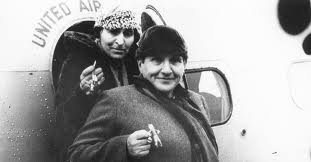Gertrude Stein’s writing will be the focus and inspiration for this cooking workshop. We will refer
to a selection of Stein’s literary masterpieces and prepare simple dishes to accompany/reflect/extend our reading of these works. This will include Tender Buttons: Objects, Food, Rooms, first published in 1914 and which employs a form of automatic writing devoid of standard notions of logic, narration and grammar.
In many respects Tender Buttons represents a verbal/culinary/erotic type of cubist-collage. Gertrude Stein did not cook as such, instead her lifelong companion and collaborator Alice B.Toklas was a talented and inventive cook who published an influential cook book ten years after Stein's death. This both documents and reminisces on the many dishes Stein and Toklas loved, treasured and served to friends during their life together before and during the Second World War in France. Toklas’s cookery book comprises recipes and anecdotes about a wide range of both basic and extraordinary dishes including: Fruit Soufflé, Small Fish in the Oriental Manner, Chinese Eggs, Omelet in an Overcoat, Salad Aphrodite, Salad Raphael, Giant Squab in Pajamas, Liberation Fruit Cake and of course Brion Gysin’s infamous recipe for Hashish Fudge.
Considering the work of the French philosopher and art critic, Louis Marin, will also provide added culinary and literary connections/diversions for the workshop. Marin, in a number of innovative essays, explores what he finds as the ‘remarkable plasticity’ that is revealed by thinking from/about the term ‘cuisine’ and the world of cooking reflected in European fables and folk stories.
Information on the series of workshops: Cooking the Books
Describing the five senses and dreams of a sixth sense (Rimbaud) provides an inspirational alibi and chimera for these experimental approaches to cooking and literature. For instance Francis Ponge’s “thing poems” are much like imaginary meals, and especially his description of bread delivers a unique evocation or model for thinking about the culinary/literary staff and stuff of life. The English phrase “cooking the books” implies being involved in fraudulent and deceptive processes or actions. Such qualities also play an important part in developing truly divergent, imaginative and innovative approaches to art. This goes for cooking as much as for any other artistic fields and areas. This series of workshops will draw inspiration from both the literary and the metaphoric implications of such a phrase, and, as such, set about investigating essentially lateral and errant, but always “healthy” ways of preparing, cooking and experiencing food.
Each workshop will adopt a set of literary references and perspectives for re-imagining and rethinking various basic culinary processes or recipes. For example the making of a simple broth or salad might be influenced and designed according to readings, and even mis-readings, of certain ancient and modern literary works. Participants will be encouraged to search out and bring their own fresh and wholesome ingredients to the workshops.
During the workshop will also appear a single-evening installation of ice objects of Ondřej Kotrč. They will be prepared from edible ingredients, so that we will be able to taste them before they slowly melt.
Marcus Bergner is an Australian artist/filmmaker presently living and working in Prague. His recently completed Ph.D. project considers experimental film in terms of new approaches within the discipline of art history. He has worked in a variety of restaurants and kitchens in Australia, Europe and UK; but the apotheosis or defining moment of his somewhat peripatetic and disparate cooking career occurred when working in a French bakery as the “boulanger” or bread-shaper. Also he is a long-term collaborator and member of the Australian sound poetry/experimental literary group Arf Arf.
During the evening also Iolanda Oliveira will present her site-specific installation in the backyard of Školská 28.
The pause is so important as action,
thereby presenting the possibility of a closed body.
A body at rest and reflection.
A body that is not expecting interaction.
Meanwhile the world remains mechanical,
and yet this body tends to relax
seek balance in an environment where "possibilities" its almost a slogan.
This is a piece that says yes, when it seems not.
The pause as an answer.
Ondřej Kotrč is a painter, a student in his final year at the Faculty of Fine Arts in Brno, studio AM3. He lives and works in Brno. His ice objects are built gradually by adding layers of color and are a time record of their formation. For this event, the color of objects will be made with edible ingredients, as described above.






